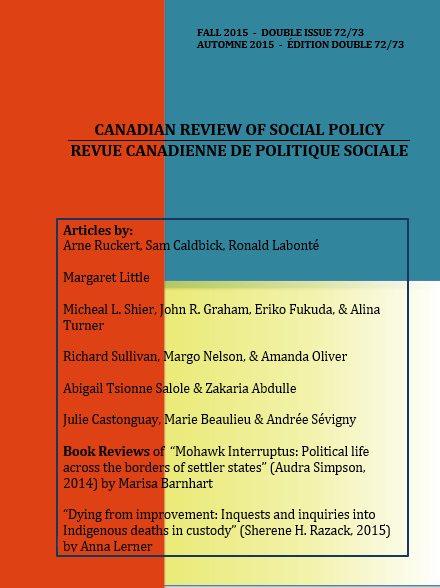Implantations des politiques sociales québécoises de soutien à domicile des aînés : Une analyse critique pour mieux comprendre les enjeux liés au bénévolat
Mots-clés :
Politiques sociales, Soutien à domicile, Personnes aînées, Bénévolat, Organismes à but non lucratifRésumé
Résumé
Les organismes communautaires québécois, acteurs indispensables du soutien à domicile des aînés, éprouvent un problème de recrutement et de fidélisation des bénévoles. Dans un contexte de vieillissement démographique et de reconfiguration de l’État où l’on fait de plus en plus appel au tiers secteur, cette situation est critique. Le fonctionnement de ces organismes repose essentiellement sur l’action bénévole, alors que la pérennité de cette dernière fait l’objet d’une inquiétude croissante. En effet, les Québécois sont historiquement moins susceptibles de s’engager bénévolement que les résidents des autres provinces canadiennes. Le Québec enregistre le taux de bénévolat le plus faible au Canada et il s’agit de la seule province où le nombre moyen d’heures de bénévolat est inférieur à la moyenne nationale.Un engagement bénévole moins élevé au Québec en comparaison aux autres provinces canadiennes s’expliquerait en partie par le régime providentiel de politiques publiques. Or, de quelle façon le contexte sociopolitique influence-t-il l’engagement bénévole dans le domaine du soutien à domicile des aînés au Québec? Pour répondre à cette question, cet article pose un regard critique sur l’implantation de trois politiques sociales et d’un cadre d’orientation qui ont marqué l’histoire du soutien à domicile au Québec, en mettant l’accent sur ce qui concerne les bénévoles et les organismes communautaires œuvrant dans ce domaine. Cette analyse permet ensuite de dégager deux enjeux récurrents, toujours d’actualité et qui ont une influence importante sur l’engagement bénévole : le financement et le partenariat entre les acteurs du soutien à domicile d’aujourd’hui.
Abstract
Quebec community organizations which are indispensable to insure home support for seniors, are experiencing problems with recruitment and retention of volunteers. This is of crucial importance in the context of an aging population and of a restructuration of the State, which relies more and more on the tertiary sector. These organizations’ day to day activities is essentially dependent on the work of volunteers, at a time when its continuity is no longer assured. Indeed, Quebeckers are historically less likely to volunteer than residents from other Canadian provinces and territories. Quebec has the lowest volunteer rates in Canada and is the only province where the average of volunteer hours is below the national one.
A lower rate of volunteerism in Quebec compared to other provinces could be explained by the welfare regime of public policy. What role does the sociopolitical context play in the rate of volunteer engagement for home support for seniors in Quebec? To answer this question, this article focuses a critical lens on the establishment of three social policies and one orientation framework which have marked the history of homecare in Quebec, particularly as it relates to volunteers and community organizations working in this field. This analysis will allow two recurring challenges to emerge, always relevant and which have a significant influence on volunteer engagement: funding and collaboration between stakeholders in home support for seniors today.
Keywords: Social policies; home care; seniors; volunteerism; non-profit organizations
Téléchargements
Publié-e
Comment citer
Numéro
Rubrique
Licence
1-The author guarantees that the manuscript is an original work not published elsewhere in print or electronically in whole or in part, except in abstract form, that the author has the full power to make this contribution, and that the manuscript contains no matter libelous or otherwise unlawful or which invades the right of privacy or which infringes any proprietary right.
2-The author guarantees that the manuscript has not been previously published in print or electronically and that if the manuscript contains any tables, figures or images fully reproduced or closely adapted from previously published material, the author must obtain the necessary permission from the author/publisher holding the original copyright prior to publication in CRSP. The author may be required to produce evidence of permission granted to CRSP’s editors.
3-As a condition of publication in CRSP, the author assigns all copyright to CRSP, including but not limited to the right to publish, republish, and otherwise distribute this manuscript in print, electronic, or other formats. As CRSP is a non-profit interdisciplinary scholarly journal, the author will receive no royalty or other monetary compensation for the assignment set forth in this agreement.
For the purpose of full disclosure, CRSP will not normally use the content provided by the author in a commercial venture, but for the purpose of disseminating the author’s content to as many readers as possible. For distribution, third parties engaging in commercial activities may be contracted to distribute the content globally, and such parties may make a profit out of the author’s content in their normal course of business. CRSP will not pay the author or reimburse the author in any form based on such commercial activities because the conduct of such commercial activities is outside the control of CRSP.
Any future reference to or use of this published material by the authors must acknowledge CRSP as the original place of publication.
PERMISSION REQUEST/ARCHIVING
Permission is given to author(s) receiving funding via Tri-Council Agencies, the Canadian Institutes of Health Research (CIHR), the Natural Sciences and Engineering Research Council of Canada (NSERC) and the Social Sciences and Humanities Research Council (SSHRC), to make their publications freely available in an Open Access repository within the stated deadline by the Tri-Council Agencies (12 months following publication). Archiving of publication must be a manuscript copy bearing none of the CRSP headers, footers or any other distinguishing marks. No links to the article on the CRSP website is permitted.
Permission requests from third parties to reproduce articles in part or full in academic/educational publications can be directed to the managing editor of CRSP, and will not be unreasonably denied.

